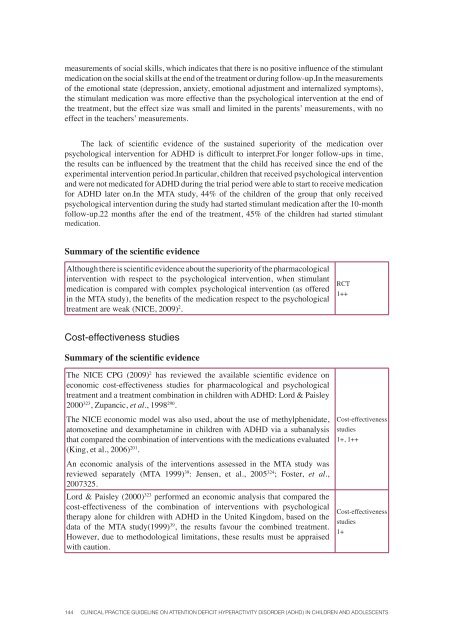CPG on ADHD
CPG on ADHD
CPG on ADHD
- No tags were found...
You also want an ePaper? Increase the reach of your titles
YUMPU automatically turns print PDFs into web optimized ePapers that Google loves.
measurements of social skills, which indicates that there is no positive influence of the stimulantmedicati<strong>on</strong> <strong>on</strong> the social skills at the end of the treatment or during follow-up.In the measurementsof the emoti<strong>on</strong>al state (depressi<strong>on</strong>, anxiety, emoti<strong>on</strong>al adjustment and internalized symptoms),the stimulant medicati<strong>on</strong> was more effective than the psychological interventi<strong>on</strong> at the end ofthe treatment, but the effect size was small and limited in the parents’ measurements, with noeffect in the teachers’ measurements.The lack of scientific evidence of the sustained superiority of the medicati<strong>on</strong> overpsychological interventi<strong>on</strong> for <strong>ADHD</strong> is difficult to interpret.For l<strong>on</strong>ger follow-ups in time,the results can be influenced by the treatment that the child has received since the end of theexperimental interventi<strong>on</strong> period.In particular, children that received psychological interventi<strong>on</strong>and were not medicated for <strong>ADHD</strong> during the trial period were able to start to receive medicati<strong>on</strong>for <strong>ADHD</strong> later <strong>on</strong>.In the MTA study, 44% of the children of the group that <strong>on</strong>ly receivedpsychological interventi<strong>on</strong> during the study had started stimulant medicati<strong>on</strong> after the 10-m<strong>on</strong>thfollow-up.22 m<strong>on</strong>ths after the end of the treatment, 45% of the children had started stimulantmedicati<strong>on</strong>.Summary of the scientific evidenceAlthough there is scientific evidence about the superiority of the pharmacologicalinterventi<strong>on</strong> with respect to the psychological interventi<strong>on</strong>, when stimulantmedicati<strong>on</strong> is compared with complex psychological interventi<strong>on</strong> (as offeredin the MTA study), the benefits of the medicati<strong>on</strong> respect to the psychologicaltreatment are weak (NICE, 2009) 2 .RCT1++Cost-effectiveness studiesSummary of the scientific evidenceThe NICE <str<strong>on</strong>g>CPG</str<strong>on</strong>g> (2009) 2 has reviewed the available scientific evidence <strong>on</strong>ec<strong>on</strong>omic cost-effectiveness studies for pharmacological and psychologicaltreatment and a treatment combinati<strong>on</strong> in children with <strong>ADHD</strong>: Lord & Paisley2000 323 , Zupancic, et al., 1998 290 .The NICE ec<strong>on</strong>omic model was also used, about the use of methylphenidate,atomoxetine and dexamphetamine in children with <strong>ADHD</strong> via a subanalysisthat compared the combinati<strong>on</strong> of interventi<strong>on</strong>s with the medicati<strong>on</strong>s evaluated(King, et al., 2006) 201 .An ec<strong>on</strong>omic analysis of the interventi<strong>on</strong>s assessed in the MTA study wasreviewed separately (MTA 1999) 39 : Jensen, et al., 2005 324 ; Foster, et al.,2007325.Lord & Paisley (2000) 323 performed an ec<strong>on</strong>omic analysis that compared thecost-effectiveness of the combinati<strong>on</strong> of interventi<strong>on</strong>s with psychologicaltherapy al<strong>on</strong>e for children with <strong>ADHD</strong> in the United Kingdom, based <strong>on</strong> thedata of the MTA study(1999) 39 , the results favour the combined treatment.However, due to methodological limitati<strong>on</strong>s, these results must be appraisedwith cauti<strong>on</strong>.Cost-effectivenessstudies1+, 1++Cost-effectivenessstudies1+144 CLINICAL PRACTICE GUIDELINE ON ATTENTION DEFICIT HYPERACTIVITY DISORDER (<strong>ADHD</strong>) IN CHILDREN AND ADOLESCENTS

















